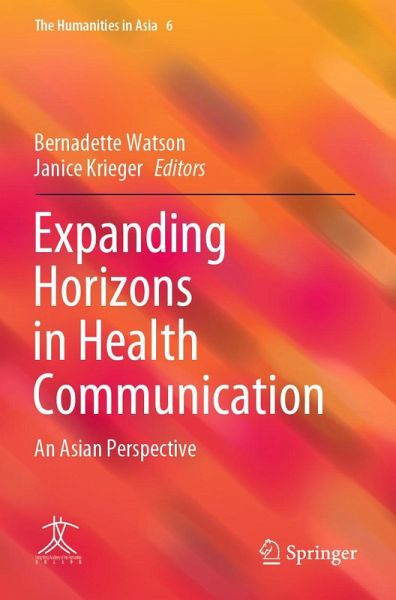
Expanding Horizons in Health Communication
An Asian Perspective
Herausgegeben: Watson, Bernadette; Krieger, Janice
Versandkostenfrei!
Versandfertig in 6-10 Tagen
113,99 €
inkl. MwSt.

PAYBACK Punkte
57 °P sammeln!
This book explores the ways in which Eastern and Western medical knowledge inform each other in the treatment of people in Asia across a wide range of health issues. To do so, it brings together health communication scholars from diverse disciplines both in Hong Kong and worldwide and combines their observations and expertise with those of clinicians working in healthcare in Asia to provide a topical portrait of the expanding horizons of healthcare in Asia. Social scientists and clinicians discuss their research and clinical practice respectively using a range of analytic approaches that inclu...
This book explores the ways in which Eastern and Western medical knowledge inform each other in the treatment of people in Asia across a wide range of health issues. To do so, it brings together health communication scholars from diverse disciplines both in Hong Kong and worldwide and combines their observations and expertise with those of clinicians working in healthcare in Asia to provide a topical portrait of the expanding horizons of healthcare in Asia. Social scientists and clinicians discuss their research and clinical practice respectively using a range of analytic approaches that include traditional qualitative and quantitative methodologies, as well as cutting-edge computer diagnostics that digitally visualize health interactions across time.
The book presents an innovative and interdisciplinary investigation of Eastern and Western perspectives on healthcare in Asia. It covers topics concerned with a range of mental and physical problems that are currently confronting Asia. Importantly, the views and experiences of front line clinicians delivering patient care in Asia are also included. Accordingly, the book offers varied and innovative perspectives on health communication issues in China, Singapore, Bangladesh and Australia.
The book presents an innovative and interdisciplinary investigation of Eastern and Western perspectives on healthcare in Asia. It covers topics concerned with a range of mental and physical problems that are currently confronting Asia. Importantly, the views and experiences of front line clinicians delivering patient care in Asia are also included. Accordingly, the book offers varied and innovative perspectives on health communication issues in China, Singapore, Bangladesh and Australia.














